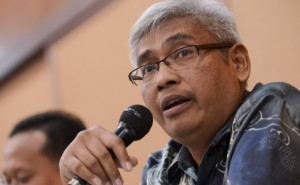Will MPs vote down the Budget as a sign of no confidence?
This was how Australia’s Tony Abbot was forced to give way to Malcolm Turnbull a month ago. Prior to that we have seen how prime minister Margaret Thatcher did the same to her colleague John Major in 1990.
Aziz Bari, The Ant Daily
Former prime minister Dr Mahathir Mohamad eventually conceded on Oct 23 that the efforts to unseat his successor Najib Razak would not succeed and the latter would likely to remain in office until the 14th general election in 2018.
Coming from the head hunter chief, as it were, one has to take the admission seriously. For one thing Mahathir has successfully brought down sitting prime ministers before.
Mahathir was seen as the prime mover behind the resignation of Abdullah Ahmad Badawi from office in 2009. The longest-serving prime minister was also credited with expediting the exit of prime minister Tunku Abdul Rahman after the general election in 1969; allowing Abdul Razak Hussein, Najib’s father, to succeed in 1970.
Political pundits here have said that politically it is almost impossible to remove the prime minister using political channels as party mechanism has been arranged in such a way that it is difficult for the incumbent to lose a leadership contest.
What we have in place here is just different from those in developed countries. We have seen how in countries such as Australia and Britain sitting prime ministers are removed via party mechanism.
This was how Australia’s Tony Abbot was forced to give way to Malcolm Turnbull a month ago. Prior to that we have seen how prime minister Margaret Thatcher did the same to her colleague John Major in 1990.
The latter’s hold on 10 Downing Street was challenged by party colleague John Redwood in 1994 but Major survived until he was deposed by Tony Blair who led the opposition Labour, beating the conservatives in the 1997 general election.
The tides were seen to be up against Najib two weeks ago when the Conference of Rulers issued a strong statement on the way his administration handled the controversial 1MDB saga. But somehow it proved to be a false alarm when a week later the Yang di-Pertuan Agong was admitted to the National Heart Institute.
Some quarters were talking about the 14th King removing Najib after the strong words from the rulers.
Constitutionally the Yang di-Pertuan Agong is simply under the mercy of the Conference of Rulers. But with his frail condition – he is already 88 years old – that is highly unlikely. Apparently a very strong character is needed; just like Governor-General Sir John Kerr who removed prime minister Gough Whitlam in Australia in 1975.
That leaves us with the motion of confidence in parliament as the last and in fact the only option from the very beginning. But we have to face another problem: the Speaker.
Perhaps the best way to describe the statements and antics put up by Pandikar Amin Mulia is that he simply misunderstood his powers as the house chief. Instead of treating his absolute powers as a means to ensure that the proceedings in the house are orderly and efficient he sees those powers as the ends in themselves.
The worst part is when Pandikar, just as what he did in September 2008, exercised the powers entrusted in his office to frustrate the constitutional process. And the irony is Pandikar is not even an elected MP!
To make the matter worse we have a confused opposition block and a leader who does not seem to know what to do. Instead of putting up the motion herself Dr Wan Azizah let a fellow MP from PKR to do it.
Of course there is no law requiring that it must be done by the leader but it shows that they are not serious on the matter. And true enough it led to internal bickering: one ensued between Hee Loy Sian and Lim Guan Eng, the DAP secretary-general.
There was actually another option to change the government. This is through the voting down of the 2016 Budget tabled by him.
Perhaps it is worth noting that there can be a change of government through any motion of major importance; one that is considered a major policy. It does not have to be a specific motion of confidence which sometimes also referred to as censure motion.
It has to be said that the Opposition – led by Anwar Ibrahim – some years ago let the Najib administration survive on a handful of votes as most of their MPs were absent during the voting stage for an annual budget. No wonder most of them – some are now on second term as MP – looked bemused when told about changing the government through a Budget rejection.
Obviously most of our MPs never bothered to study what happened in the weeks before the Whitlam government in Australia collapsed in 1975.
Dr Abdul Aziz Bari is a former law professor at International Islamic University Malaysia where he taught law for more than 22 years.


